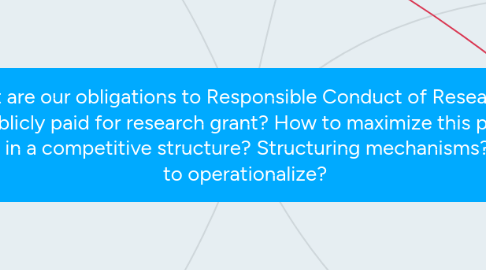
1. Grant Policy
1.1. Benefits to Research Practice
1.1.1. Encourages active model of engagement
1.1.2. Makes explicit expectations and eligibilities - key in interdisciplinary teams where practices may differ
1.1.3. Clear articulation of process to ensure transparency - ground rules with no excuse for not knowing
1.1.4. Attempts to create equitable environment for team activities - everyone can start a paper, workshop or poster. Ideas not hierarchy or history. Flattening of hierarchies.
1.1.5. Attempts to set tone of equity and integrity in research conduct - supports research excellence
1.1.6. Flexibility to bring in additional experts - optimizes quality of research output and use of data
1.1.7. Defines responsibilities when team member steps forwards with idea - clear policy operationalisation
1.1.8. Not only "thou shall not' policy - includes facilitation of access to funding to support research activities
1.2. Benefits to Data Analysis
1.2.1. Everyone is encouraged to form and lead a research question - no data access hierarchy to block team creativity
1.2.2. Possibility of more perspectives and wider range of expertise from interdisciplinary etc team applies to research questions
1.2.3. Possibility of brining in additional collaborators from outside team to facilitate exploring additional research questions so that data are being used more fully
1.2.4. Timely team identification, data analysis and publication are supported
2. What are we adding to the literature?
2.1. data = the fruit of the publicly paid for grant
2.1.1. given ethical and practical problems of sharing widely, at a minimum data must be responsibly shared internally
2.1.2. is internal data sharing unusual? Not sure if this is about open access
2.1.3. what is it about sharing data internally that is unique or different?
2.1.3.1. data is a kernel
2.2. Operationalization of how to maximize publicly paid for grant resources in an equitable and fair way and adhere to Canadian RCOR as per 2010 policy
2.3. How do team grants maximize creation and access to data, research etc?
2.3.1. team grants behaviour as a black box
3. Possible Journals
3.1. Journal of research practice
3.2. Med Ed journals, ie academic medicine
3.3. BMC
4. Tri-Agency framework: Responsible conduct of research
4.1. Policy is to support the Agencies in discharging their legislative mandates to promote and assist research and discharging their responsibility to foster a positive research environment
4.2. Objectives: 1. ensure that funding decisions made by agencies are based on accurate and reliable data;2. ensure public funds for research are used responsibly and in accordance with funding agreements; 3. promote and protect the quality, accuracy and reliability of research funded by the Agencies; 4. promote fairness in the conduct of research and in the process for addressing allegations of policy breaches
4.3. 8 breaches: fabrication, falsification, destruction of research records, plagiarism, redundant publications, invalid authorship, inadequate acknowledgement, mismanagement of COI
5. Open Access Movement
5.1. Data & research is a public good
5.1.1. Free access to claims, proposal, knowledge, data, methods etc
5.1.1.1. data and knowledge are not commodities
5.2. Worldwide movement
5.2.1. Technology as a driver of changing research practices
5.2.1.1. materials and infrastructure allows for a reconstitution of how research is actually accomplished
5.3. knowledge is nonrivalrous
5.3.1. share without dividing, consume without diminishing it
5.3.2. Digital data
5.3.3. authorship is rivalrous
6. Authorship (one piece of RCOR) is rivalrous
6.1. Academic structure is competitive / rivalrous
6.2. culture and hierarchy plays significant role
6.2.1. RCOR, we know, plays a role but there is still poor grant management
6.3. Accepted practices
7. Possible Flow
7.1. Federally & institutionally mandated RCOR
7.2. Empirical papers on RCOR - fascinating results!
7.3. Open Access Movement to Results, Data etc
7.4. Context, Grant, Interdisciplinarity
7.5. Using infrastructure / technology | context & grant itself | sociomaterialsm
7.6. The Policy
7.7. What does the policy do?
7.7.1. Access to data
7.7.2. What is special about data?
7.7.3. sets expectations and culture
